On August 26, 1969, the 1st Michigan Pop Festival, became the biggest rock and roll event in Bay City, Michigan, during the 1960s. It drew an estimated 4,000 music lovers to the Roll-Air outdoor roller skating rink on State Park Drive for a day-long show that featured some of the state’s finest bands.
Although this type of event was new to Bay City, similar festivals had already been held in cities across the state; the first being Detroit’s Belle Isle Love-In in April of 1967 followed by the Southfield Pop Festival in July. Festivals increased 1968 and included the first Saugatuck Pop Festival in July, the Oakland Pop Festival and Detroit’s Dialogue ’68 in September, and the Kalamazoo Pop Festival in October.
The festival movement blossomed in Michigan in 1969. 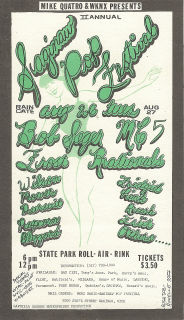 Originally called the Saginaw Pop Festival on handbills, the name was later changed to the 1st Michigan Pop Festival after the site was moved to Bay City.Detroit staged three more large music events that year, and by early August there had also been pop/rock festivals in Grand Rapids, Saginaw, Midland, Kalamazoo, Saugatuck, Petoskey, Mt. Clemens, and at Delta Community College.
Originally called the Saginaw Pop Festival on handbills, the name was later changed to the 1st Michigan Pop Festival after the site was moved to Bay City.Detroit staged three more large music events that year, and by early August there had also been pop/rock festivals in Grand Rapids, Saginaw, Midland, Kalamazoo, Saugatuck, Petoskey, Mt. Clemens, and at Delta Community College.
The Bay City event was scheduled less than two weeks after the nationally acclaimed Woodstock Music & Art Fair held at Max Yasgur’s 600-acre dairy farm, near the town of Bethel, New York. The 1st Michigan Pop Festival, with an estimated crowd of 4,000, paled in comparison to Woodstock’s 400,000 attendees and 32 performing acts. Numbers aside, however, the Bay City happening and the other 1969 festivals in the state occurred at what seemed to be a peak time for Michigan rock and roll bands.
During the previous year, a number of the state’s top groups had signed recording contracts with nationally-known labels and had already released albums. The Bob Seger System and SRC were signed to Capitol, The Frost with Vanguard, The Amboy Dukes were on Mainstream, Frijid Pink was signed to Parrot, and both the MC5 and The Stooges were on Elektra Records. The Rationals had inked a contract with Crewe Records and were working on their debut album; and a new group called Grand Funk Railroad had recently signed with Capitol Records even though they had formed just months earlier.
In addition, some of the Michigan bands had also enjoyed hit singles on Billboard’s Hot 100 during the past 12 months. Both The Amboy Dukes’ “Journey To The Center Of The Mind”, and the Bob Seger System’s “Ramblin’ Gamblin’ Man” were Top 20 hits; and the MC5’s controversial “Kick Out The Jams” also charted early in 1969.
Roll-Air was a walled-in, outdoor skating facility that, along with Putt Tee miniature golf and Tony’s Amusement Park, was part of a popular summer entertainment complex located just west of Bay City State Park. The owners were two married couples who were also educators in Bay City public schools. Bob and Ilene Darbee and Octavian and Chris Gavrila had purchased the properties in the spring of 1964, and they quickly turned the Roll-Air skating rink into a weekly rock and roll hotspot. 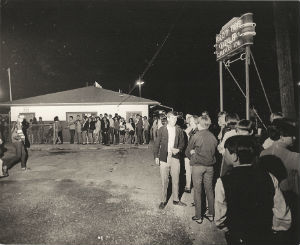 The line of teens to enter Roll-Air
The line of teens to enter Roll-Air
They accomplished this by partnering with DJs Bob Dyer and Dick Fabian from WKNX-AM to host teen dances and the extremely popular Battle of the Bands competitions on Tuesday nights. After a few years, the rock and roll nights had evolved into concerts featuring top Detroit-area bands. It was common for these weekly events to attract 2,000 teens into the 70 ft. x 206 ft. concrete-floored skating rink.
According to the Bay City Times article ‘Pop Festival Draws Thousands’, published the next day on August 27th, three organizations – Tony’s Amusement Park, WKNX Radio, and Mike Quatro Inc. – collaborated to bring the festival to Bay City. Bob Darbee and Octavian Gavrila, owners of Tony’s Park and Roll-Air, organized the operation and the physical plant. Mike Quatro Inc. provided the entertainment, and WKNX with Bob Dyer added the publicity and co-sponsored the event.
Bob Dyer was already a legend at WKNX, mid-Michigan’s most popular AM station. He had joined the station in 1950 and, in those pre-rock days, had hosted live country music shows on the air and booked country acts at the Saginaw Auditorium. When WKNX-TV started broadcasting in 1953, Dyer was one of the station’s early on-air personalities. By the mid-1950s, Dyer smoothly moved into playing rock and roll on his daily show and quickly became one of the area’s most popular DJs.
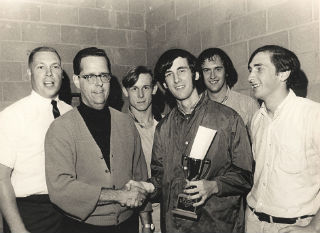 (L to R) Bob Darbee and Bob Dyer congratulate the winners of a Battle of the Bands competition at Roll-Air
(L to R) Bob Darbee and Bob Dyer congratulate the winners of a Battle of the Bands competition at Roll-Air
Dyer was honored by Billboard magazine in 1960 and also received an accolade from Michigan governor G. Mennen “Soapy” Williams for his on-air achievements. After co-hosting the weekly Battle of the Bands for three years at Roll-Air, Dyer, along with fellow DJ Dick Fabian, started renting the gymnasium at the Saginaw Y.M.C.A. for Saturday dance/concerts called the Y A-Go-Go. Booking national acts through the famous William Morris Agency, Dyer and Fabian brought performers like Simon & Garfunkel, the Dave Clark Five, Glen Campbell, and the Lovin’ Spoonful to their Saginaw events.
Mike Quatro was a young rising star among Detroit promoters in 1969. He was the son of jazz band leader Art Quatro and had taken over his father’s promotion business in 1967. In less than two years, he had reportedly turned it into a million dollar operation by concentrating on booking rock and roll acts. Quatro was a talented musician in his own right, playing piano at a young age and, as a teen, earning a spot on The Lawrence Welk Show during the late 1950s.
Quatro became an important figure in Michigan rock and roll circles in 1969 after promoting the Detroit Pop Festival at the Olympia Stadium, which drew 16,000 for a lineup of mostly local bands, and the Saugatuck Pop Festival near Lake Michigan that attracted a crowd of over 20,000. As a result of his success, Mike Quatro was profiled in stories that appeared in both the Detroit Free Press and the Detroit News. In addition, he was written about in one of the early editions of Detroit’s Creem magazine, which had begun publishing in March of 1969.
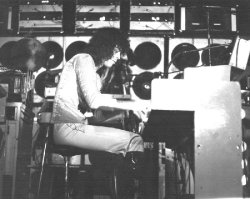 Mike Quatro
Mike Quatro
At this point in time, mainstream newspapers seemed to approach the hippie lifestyle with both curiosity and amusement. The Detroit Free Press story described Quatro as “a mod dresser with a carefully groomed mop of hair”; and stated that his youth (25 years old) gave him a big edge over many booking agents. The profile in the Detroit News gushed about the office in his Grosse Pointe home and its “upstairs soundproof bedroom (the walls are carpeted) where he and his wife can get away from it all.” The story also included a photo of Mike and Lyn Quatro relaxing on a bedspread of lion, zebra, leopard, and beaver skin.
According to both the early flyers put out by Gavrila and Darbee Enterprises and the press release by Mike Quatro Inc., the event at Roll-Air was originally to be called the Second Saginaw Pop Festival. The flyer listed Bob Seger, the MC5, Frost, and the Rationals as headliners in larger print; with the supporting acts including Wilson Mower Pursuit, Popcorn Blizzard, Frijid Pink, Rush, Frut and others listed in smaller print below. The press release from Mike Quatro Inc. that was done by Rick Kay Public Relations contained over a half dozen spelling errors, the most glaring of which were The Frost misspelled as "The Front" and Wilson Mower Pursuit as "Wilson More Pursuit".
Sometime before August 26th the name was changed to the 1st Michigan Pop Festival. This was probably done to avoid the confusion among concert-goers that was bound to occur over a Saginaw Pop Festival that was actually being held in Bay City. (The first Saginaw Pop Festival was presented earlier in the year on April 9th at the Saginaw Auditorium.) Having 'Michigan' in the title also seemed to give the festival more gravitas and better positioned it to take advantage of all the positive publicity and vibes that continued to come out of the Woodstock event. 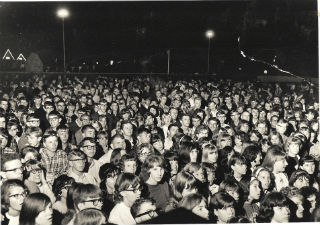 The crowd of teens at Roll-Air
The crowd of teens at Roll-Air
According the next day’s story in the Bay City Times, everything went well at the festival. Staff writer J Timothy Penn wrote: “They sat, they listened, they jammed, and they grooved – the one thing they didn’t do was cause trouble. More than 4,000 music-loving teenagers packed the Bay City Roll Air Rink Tuesday night. The overflow crowd- around 2,000 more than the usual Tuesday ‘Battle of the Bands’ crowd at Roll Air – heard the 1st Michigan Pop Festival.”
“The crowd started arriving at the park around 2 p.m., some carrying knapsacks and packs, some slept on the beach at Bay City State Park. They hitchhiked in from various parts of the state, a few came from as far away as New York. It was a transient crowd, as they moved in and out of the band area faster than the bands that furnished the night’s entertainment.”
“The comments on the various groups ranged from ‘just noise’ to ‘just fantastic’; most of the bands did provide a good sound that seemed to entrance the young audience” Penn wrote. “The real drawing card for the event said one mopped-haired teen, was that everyone else was going to be there. ‘People like to be where other people like them are,’ he added. A female spectator said: ‘Just look around with your eyes and ears open. There’re all kinds of great things happening’.”
Frut of the Loom opened the show. The band formed in Mt. Clemens and had independently released one single, “One Hand In the Darkness” b/w “A Little Bit Of Bach” on the Loom label, prior to appearing at Roll-Air. David A. Carson in Grit, Noise And Revolution wrote that Frut of the Loom “projected a campy hippie band image. Their lead singer, Norm Lieberman, went by the name Panama Red. Their musical style was all over the place, ranging from country to hard rock to 1950s-style rock and doo-wop ballads.” 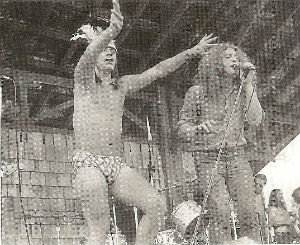 Frut of The Loom
Frut of The Loom
Later in 1969, the band shortened its name to ‘The Frut’ and added a horn section called ‘The Famed Warbles’. This lineup released two albums on the Westbound label: “Keep On Truckin’” in 1971 and “Spoiled Rotten” in 1972.
The Rush that played at the festival was the Flint-based band that featured Mark Farner’s younger brother, Ricky, on guitar. Ricky Farner was interviewed for Kristofer Engelhardt’s biography of Mark Farner, From Grand Funk To Grace, and had this to say about Rush from Flint: “When I was 15 years old I was in bands playing all over Michigan, making more money than my dad did in the factory! I was in a local band called Rush – not the well-known band Rush.” Little is known about Rush from Flint other than the original line-up also included John Raatz, Bruce Crawley, and Rocco Peraino. The band stayed together from 1969 to 1972 and made no vinyl recordings.
There was another band named Rush from Warren, Michigan, playing around the state at that time. The Rush from Warren was on the flyer for the Mt. Clemens Pop Festival that took place on August 3, 1969; and the band played that day at Sportsman’s Park. The Mt. Clemens event was co-produced by Michael Quatro and featured a number of nationally known artists including Country Joe and the Fish, Eric Burdon, John Mayall, and Muddy Waters. The Rush that played at Mt. Clemens was together from 1968 through 1969 and did not make any vinyl recordings. Neither of these short-lived Michigan bands should be confused with the Canadian band, Rush, that formed in Toronto in 1968 and was inducted into the Rock and Roll Hall of Fame in 2013.
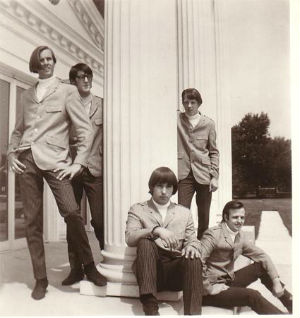 The Unrelated Segments
The Unrelated Segments
The members of the Unrelated Segments were from Detroit’s downriver suburbs. Lead vocalist Ron Stults and lead guitarist Rory Mack were from Taylor, bassist Barry Van Engelen from Lincoln Park, drummer Andy Angellotti from Melvindale, and rhythm guitarist John Torock from Allen Park.
The band recorded two classic garage rock anthems, “The Story Of My Life” and “Where You Gonna Go”, on independent labels that were stymied by inadequate promotion and distribution. The Unrelated Segments released their final single, “Cry Cry Cry”, during the summer of 1968. The band broke up several months after appearing at the Michigan Pop Festival.
The Pleasure Seekers were an all-girl band composed of Michael Quatro’s sisters; Patti, Arlene, Suzi, and Nancy. By the time they appeared at the festival, original drummer Nancy Ball had been replaced by Nancy Rogers. The group recorded two singles: “What A Way To Die” b/w “Never Thought You’d Leave Me” on Hideout in 1966 and “Light Of Love” b/w “Shame” on Mercury in 1967. The Pleasure Seekers were the only act at the Michigan Pop Festival that had been part of a USO package show that had entertained troops in Vietnam.
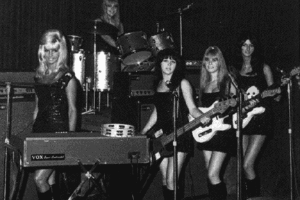 The Pleasure Seekers
The Pleasure Seekers
Following their appearance in Bay City, Arlene Quatro left the band and the group changed its name to Cradle. After Cradle broke up, Suzi Quatro was signed as a solo artist by producer Mickie Most (Donovan, The Animals, Herman’s Hermits) and brought to England. In 1973, sporting black leather and fronting a male band, Suzi recorded the first of 15 charting singles in Great Britain and became a star in that country’s glam rock scene. Although her recording career was not as successful in America, she eventually found TV stardom in 1977 with a recurring role as Leather Tuscadero on Happy Days.
Perhaps the most fascinating of the lesser-known bands to play at the festival was the Floating Circus. Frustrated by the fact that their guitarists kept leaving the band; the remaining members decided to continue on without a guitar player. To better reflect this new direction, they changed their name from the Popcorn Blizzard to the Floating Circus shortly before the Michigan Pop Festival. 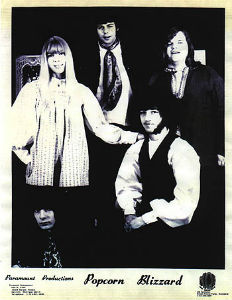 The Popcorn Blizzard changed their name to the Floating Circus. (L to R) Susie (Kaine) Woodman, Rick Bozzo, Pete Woodman, and Meat Loaf
The Popcorn Blizzard changed their name to the Floating Circus. (L to R) Susie (Kaine) Woodman, Rick Bozzo, Pete Woodman, and Meat Loaf
The band’s best-known member was drummer Pete Woodman. He had previously drummed in The Bossmen with Dick Wagner, one of mid-Michigan’s best and most popular bands from 1964 to 1967. The Floating Circus also featured Woodman’s wife, Susie (Kaine) Woodman, on keyboards and flute, Rick Bozzo on bass, and a very large lead singer named Meat Loaf. It’s certain that no one at the festival could have possibly predicted that Meat Loaf would go on to stardom as a solo artist in the late 70s.
Another interesting fact about the band is that they recorded their lone single at a studio in Bay City. While still named the Popcorn Blizzard, the band recorded two songs, “Once Upon A Time” and “Hello” at the Art Schiell studio and the single was released on the tiny Magenda label in 1968. Schiell’s small studio was located in a back room in his home at 405 Raymond Street on Bay City’s west side. According to bassist Rick Bozzo, Schiell had trouble positioning the microphone to accommodate Meat Loaf’s powerful voice in such a tiny space. Two years earlier, in the spring of 1966, ? and the Mysterians recorded their # 1 hit, “96 Tears”, in that very same studio.
Frijid Pink was composed of drummer Rick Stevers and bassist Tom Harris from Allen Park and guitarist Gary Thompson and lead singer Kelly Green from Wyandotte. The band was signed to Parrot Records and had begun recording their debut album. Their first single, “Tell Me Why”, was minor hit in Detroit, but most of the people at the festival were probably unfamiliar with Frijid Pink when they took the Roll-Air stage.
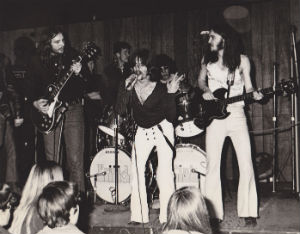 Frijid Pink: (L to R) Gary Thompson, Kelly Green, Rick Stevers, and Tom Harris
Frijid Pink: (L to R) Gary Thompson, Kelly Green, Rick Stevers, and Tom Harris
That would all change five months later when the band released their heavy, guitar-driven cover of “House Of The Rising Sun” as a single. It not only reached # 1 in Detroit but it became a national hit as well. It peaked at # 7 on the Billboard Hot 100 and earned the band a gold record in the process, the first ever awarded to a Detroit hard rock band.
“House Of the Rising Sun” was also a huge hit in Europe, spending 11 weeks at # 1 in Germany and 4 months on the British charts. On the strength of their hit single, the band’s self-titled album, “Frijid Pink”, became a hit as well, reaching # 11 on Billboard’s Top 40 Album chart.
The four most popular acts at the festival were the headliners: SRC, The Frost, The Rationals, and the Bob Seger System. The crowd at the Roll-Air rink got a chance to see Bob Seger at an unusual time in his career. Although his latest Capitol Records single, “Noah”, was popular in Michigan, it had failed to break into the Billboard Hot 100 in the summer of 1969 and Seger had seemingly grown tired of the music business. 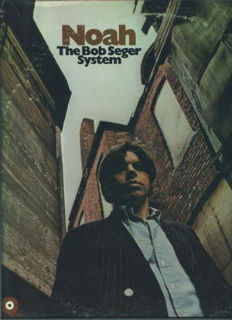
The band had expanded to a five-piece unit with Seger on guitar and vocals, Don Honaker on bass, Pep Perrine on drums, Bob Schultz on organ, and a mysterious new singer/guitarist named Tom Neme when it began work on its second album. In a later interview Seger said this about the “Noah” album: “We got this guitar player named Tom Neme, and Neme came up with all these songs he wanted to do. At that point, I was really tired. That’s when I enrolled in college.”
Little is known about Tom Neme but, because of Bob’s lack of involvement, more of Neme’s songs and vocals appeared on the “Noah” album than Seger’s, making it the weakest Bob Seger album by far. The LP was released just weeks after the Bob Seger System’s performance at the Michigan Pop Festival and, not surprisingly, it was a total sales flop.
Although Neme most likely performed with the Bob Seger System at the Michigan Pop Festival, Seger fired him before recording the band's next album. 1970’s “Mongrel” was a return to form for Seger but it was not a big seller outside of Michigan. It would take six more years of touring and recording before he would enjoy his first Top 40 album (“Live Bullet”) and first Top 10 single (“Night Moves”).
The Rationals were one of Michigan's most popular bands in the 1960s. The group had a massive regional hit with their cover of Otis Redding's "Respect" in 1966. The song was first released on Jeep Holland's A-Square label, and it reached # 92 on the Billboard Hot 100 in the fall after the group signed with Cameo-Parkway and the single was released nationally. The Rationals' version of "Respect" was recorded seven months before Aretha Franklin covered the song in 1967 and made it one of her signature hits.
In late 1968, the Rationals parted with manager Jeep Holland. The band wanted to move away from the "white soul" covers with Holland and begin to write and perform original material with a harder edge. The band's first effort in that direction was the rocking, group-written single "Guitar Army", released on the local Genisis label in early 1969. 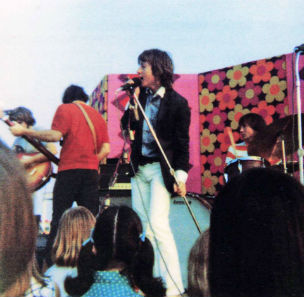 Scott Morgan and The Rationals at the 1st Michigan Pop Festival at Roll-Air
Scott Morgan and The Rationals at the 1st Michigan Pop Festival at Roll-Air
Following the release of the single, the Rationals played a residency at The Scene, the famous New York City music club. After seeing the band play there, the manager of Blood, Sweat and Tears offered lead singer Scott Morgan a chance to audition for Al Kooper's recently vacated position in the group, but Morgan turned down the offer and decided to stay with the Rationals.
By the time the band played the 1st Michigan Pop Festival in Bay City, they had already recorded an album's worth of material at the Artie Field's Studio in Detroit. Because they no longer had a recording contract, their manager arranged for the band to get financial backing from Robin Seymour, the well-known Detroit radio and televison personality.
Seymour would help get the Rationals signed to Crewe Records. "The Rationals" album, released in early 1970, sold poorly despite containing compelling originals like "Guitar Army" and "Sunset" along with top-notch covers of "Barefootin'" and "Handbags and Gladrags". Frustrated by the album's failure, the band's financial problems, and arguments among members over musical direction, the Rationals called it quits during the summer of 1970.
SRC was riding high when they performed in Bay City. In 1968, the band split with their first manager, Jeep Holland, and changed their name from the Scot Richard Case to SRC. Formed in Ann Arbor, the original lineup was Scott Richardson on lead vocals, Gary Quackenbush on lead guitar, organist Glenn Quackenbush, bassist Robin Dale, Steve Lyman on rhythm guitar and vocals, and E.J. Clawson on drums.
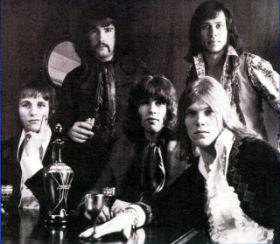 SRC (formerly the Scot Richard Case)
SRC (formerly the Scot Richard Case)
The band was signed to Capitol Records and its self-titled debut album, “SRC” was a hit in Michigan but stalled nationally at # 147 on Billboard after four weeks on the LP chart. Its psychedelic lead single, “Black Sheep”, was very popular in Michigan but did not chart nationally.
SRC released its second album, “Milestones”, in the spring of 1969. By this time, Al Wilmot had replaced Dale on bass. “Milestones” was a very commercial record, and it did better than its predecessor, staying on the Billboard album chart for 9 weeks and reaching # 134. “Up All Night” was released as a single but its airplay was restricted on some radio stations because of suspected drug references.
Songs from “Milestones” , including “Checkmate”, “Eye Of The Storm”, “The Angel Song” and the crowd-pleasing instrumental “Hall Of the Mountain King/ Bolero” were featured at SRC’s 1969 shows. Shortly after their performance at the Michigan Pop Festival, guitarist Gary Quackenbush was seriously injured in a motorcycle accident and his distinctive sustained guitar sound was absent from SRC’s disappointing 3rd album, 1970’s “Traveler’s Tales”.
SRC and Capitol Records parted ways in 1970, and the band eventually signed with the Motown subsidiary, Rare Earth Records. They recorded one single under the name Blue Scepter but an album was never released. Deep in debt as a result of poor management, SRC played its last gig in January of 1973.
The Frost seemed like the best bet for national stardom among the Detroit bands of the late '60s. Led by Dick Wagner, a very talented guitarist and songwriter, the band also featured drummer Bobby Rigg, Donny Hartman on rhythm guitar, and Gordy Garis on bass. The Frost had a batch of great original songs and was a powerful live act both vocally and instrumentally.
Wagner had first gained prominence in Michigan with The Bossmen out of Saginaw. Long before the do-it-yourself ethic became associated with the punk rock movement of the late '70s, Wagner was putting out catchy Bossmen singles on his own label, selling them at gigs, and gaining radio play by bringing the 45s to big and small stations wherever they played around the state. 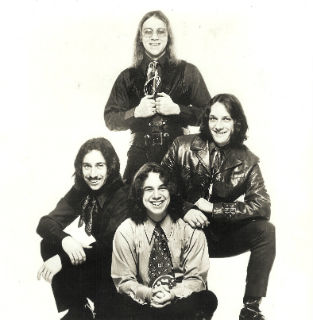 Frost: (Top) Gordy Garis (L to R) Donny Hartman, Bobby Rigg, and Dick Wagner
Frost: (Top) Gordy Garis (L to R) Donny Hartman, Bobby Rigg, and Dick Wagner
The Frost signed with Vanguard Records in 1969 and released their stunning debut album, “Frost Music”, in March. Boosted by the outstanding first single, “Mystery Man”, the album was a gigantic hit in Michigan, selling over 40,000 copies in its first few months.
By the time that The Frost dazzled the crowd at Roll-Air in August, however, it had become apparent that Vanguard was not living up to its promise to promote and distribute the band’s record in markets outside of Michigan. The group played all over, from L.A. to Canada, to support the new album, and according to Wagner, “There were never any records.” The Frost’s popularity in the Midwest helped push the LP to # 148 in Billboard but their record label’s lack of distribution killed further sales.
Several weeks after the Michigan Pop Festival, The Frost recorded live performances at the Grande Ballroom for their second album, "Rock And Roll Music". The driving title track was released as a single and reached # 105 on Billboard but the album again stalled at # 148, a victim once again of Vanguard's poor distribution. After their strong third album, "Through The Eyes Of Love", failed to sell outside of Michigan, the Frost broke up, never reaching their vast potential.
Although the band lineup for the festival was slightly different from what was announced earlier, the only big disappointment was the MC5's failure to show up for their scheduled performance. Mike Quatro said of their absence: “They had a stronger commitment to record in New York.”
The past few months had been tumultuous for the MC5. They had been released from their Elektra recording contract following two disputes. The first involved the MC5’s use of the Elektra logo in a full-page “Fuck Hudson’s” ad in Ann Arbor’s underground newspaper, The Argus. The advertisement was placed in retaliation for the department store chain’s refusal to stock the controversial “Kick Out The Jams” album. The second was over Elektra’s decision to remove the f-word from the album version of the “Kick Out The Jams” and the LP’s liner notes without the knowledge and consent of the band.
After signing with Atlantic Records, the MC5 parted ways with their manager, John Sinclair, and the White Panther Party. Drummer Dennis Thompson said it best: “It was about rock ‘n’ roll music. Sure politics got us a lot of press, but we really wanted to be a big, big rock ‘n’ roll band, not just Sinclair’s personal political platform.”
Four weeks before the 1st Michigan Pop Festival, John Sinclair was put on trial and found guilty on a possession of marijuana charge – third offense. Judge Robert Columbo sentenced Sinclair to nine-and-a-half years in the State Prison at Southern Michigan at Jackson for the possession of two marijuana joints.
Even without the MC5, the 1st Michigan Pop Festival was a success; the weather was great, and a total of nine bands performed. Around midnight, the scheduled closing time for the event, the state police got some complaint calls from neighbors about the noise. At 2 a.m. the state police came and called a halt to the program. There were no reported incidents involving the bands or the spectators as the festival came to a peaceful end.

